Here you will find news on CLIENT II, current project developments as well as reports on sustainable innovations from the seven subject areas and all regions. You can narrow the selection by choosing the subject or region you are interested in from the menu. If you would like to be updated regularly, you can subscribe to the CLIENT II newsletter.
Did you miss something? You can find the newsletter archive via the right button.
News Article List
- Image
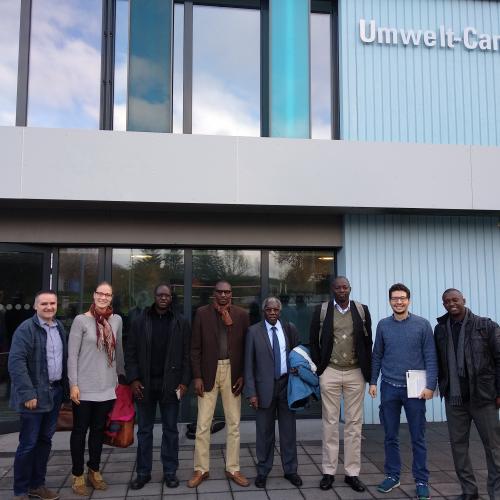 26.10.2019SenegalSustainable energy systemsBetween 21 and 25 October, the Institute for Applied Material Flow Management (IfaS) at Trier University received its Senegalese partners from the Local Sustainable Energy Networks in Senegal (LoSENS) project. They came to the university’s Environmental Campus Birkenfeld to attend the tenth edition of the International Circular Economy Week.
26.10.2019SenegalSustainable energy systemsBetween 21 and 25 October, the Institute for Applied Material Flow Management (IfaS) at Trier University received its Senegalese partners from the Local Sustainable Energy Networks in Senegal (LoSENS) project. They came to the university’s Environmental Campus Birkenfeld to attend the tenth edition of the International Circular Economy Week. - Image
 10.10.2019VietnamClimate protection/ energy efficiency, Adaptation to climate changeThe CLIENT II project CAMaRSEC was officially launched on 10 October with a kick-off conference and the inauguration of the local project office in Hanoi.
10.10.2019VietnamClimate protection/ energy efficiency, Adaptation to climate changeThe CLIENT II project CAMaRSEC was officially launched on 10 October with a kick-off conference and the inauguration of the local project office in Hanoi. - Image
 30.09.2019KyrgyzstanWater management, Land management, Sustainable energy systemsOn 30 September 2019, the CLIENT II project ÖkoFlussPlan was officially launched. Nearly 50 German and Kyrgyz stakeholders met for the kick-off in the city of Naryn.
30.09.2019KyrgyzstanWater management, Land management, Sustainable energy systemsOn 30 September 2019, the CLIENT II project ÖkoFlussPlan was officially launched. Nearly 50 German and Kyrgyz stakeholders met for the kick-off in the city of Naryn. - Image
 26.09.2019Resource efficiency and circular economy, Water management, Climate protection/ energy efficiency, Adaptation to climate change, Land management, Sustainable energy systems, Natural hazardsOn 17 and 18 September 2019, representatives of all the joint research projects approved under the CLIENT II funding initiative came together for the first CLIENT II conference, held at the “Umweltforum” in Berlin. The conference provided a networking opportunity for over 50 international research projects and accompanying scientific projects. The 200 participants were able to discuss how to develop and implement innovative solutions in the areas of climate, environment and energy. They were also given a platform to exchange views on current challenges in their work.
26.09.2019Resource efficiency and circular economy, Water management, Climate protection/ energy efficiency, Adaptation to climate change, Land management, Sustainable energy systems, Natural hazardsOn 17 and 18 September 2019, representatives of all the joint research projects approved under the CLIENT II funding initiative came together for the first CLIENT II conference, held at the “Umweltforum” in Berlin. The conference provided a networking opportunity for over 50 international research projects and accompanying scientific projects. The 200 participants were able to discuss how to develop and implement innovative solutions in the areas of climate, environment and energy. They were also given a platform to exchange views on current challenges in their work.
- Image
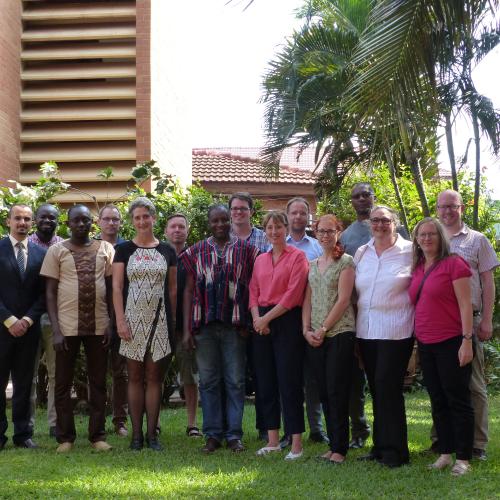 07.09.2019GhanaSustainable energy systemsFrom 5 to 7 September 2019, the kick-off workshop for the project EnerSHelf took place in Ghana. On-site, the participants discussed common goals and visited a project site.
07.09.2019GhanaSustainable energy systemsFrom 5 to 7 September 2019, the kick-off workshop for the project EnerSHelf took place in Ghana. On-site, the participants discussed common goals and visited a project site.
- Image
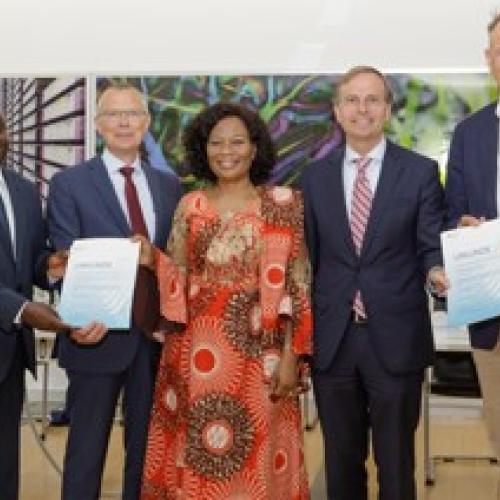 13.08.2019Benin, NigeriaSustainable energy systemsYESPV-NIGBEN is a German-African CLIENT II project that aims to support food and energy production in Nigeria and Benin by developing climate-friendly and efficient land-use resources for food and energy production. At the launch event at the research institute Forschungszentrum Jülich on 13 August, Thomas Rachel (MdB) from the German Federal Ministry of Education and Research (BMBF) presented the funding certificates to Prof. Harald Bolt from the Board of Directors of Forschungszentrum Jülich and Dr. Solomon Agbo, who is coordinating the project, as well as other project partners.
13.08.2019Benin, NigeriaSustainable energy systemsYESPV-NIGBEN is a German-African CLIENT II project that aims to support food and energy production in Nigeria and Benin by developing climate-friendly and efficient land-use resources for food and energy production. At the launch event at the research institute Forschungszentrum Jülich on 13 August, Thomas Rachel (MdB) from the German Federal Ministry of Education and Research (BMBF) presented the funding certificates to Prof. Harald Bolt from the Board of Directors of Forschungszentrum Jülich and Dr. Solomon Agbo, who is coordinating the project, as well as other project partners. - Image
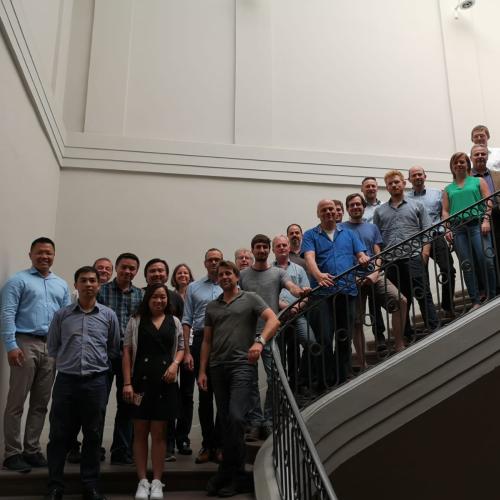 20.07.2019VietnamWater managementFrom 18th to 19th July 2019 a project meeting at the German ViWaT-Engineering partner took place.
20.07.2019VietnamWater managementFrom 18th to 19th July 2019 a project meeting at the German ViWaT-Engineering partner took place. - Image
 04.07.2019KazakhstanOn 24/6/2019, German and Central Asian representatives from science and industry met in Almaty to usher in the launch of the CASIB regional office as part of a stakeholder conference. The event focused on the emergence and strengthening of networks for joint scientific and economic collaboration between Germany and Central Asia in the context of the CLIENT II funding measure.
04.07.2019KazakhstanOn 24/6/2019, German and Central Asian representatives from science and industry met in Almaty to usher in the launch of the CASIB regional office as part of a stakeholder conference. The event focused on the emergence and strengthening of networks for joint scientific and economic collaboration between Germany and Central Asia in the context of the CLIENT II funding measure. - Image31.05.2019NamibiaAdaptation to climate change, Sustainable energy systemsAt the beginning of April, the Institute for New Energy Systems (InES) at the Ingolstadt University of Applied Sciences (THI) launched a new project for sustainable energy supply in rural Africa: PROCEED (short for "Pathway to Renewable Off-Grid Community Energy for Development").
- Image
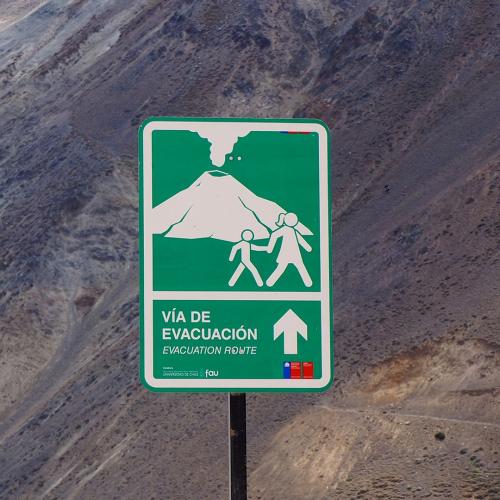 29.05.2019Chile, Ecuador, PeruAdaptation to climate change, Land management, Natural hazardsUrban agglomerations are growing worldwide and new megalopolises are emerging. The dense settlement structures with millions of people are particularly vulnerable to natural hazards. In the RIESGOS project (Spanish for "risks"), the Earth Observation Center (EOC) of the German Aerospace Center (DLR) investigates natural hazards and their interactions using the Andean region as an example.
29.05.2019Chile, Ecuador, PeruAdaptation to climate change, Land management, Natural hazardsUrban agglomerations are growing worldwide and new megalopolises are emerging. The dense settlement structures with millions of people are particularly vulnerable to natural hazards. In the RIESGOS project (Spanish for "risks"), the Earth Observation Center (EOC) of the German Aerospace Center (DLR) investigates natural hazards and their interactions using the Andean region as an example.
